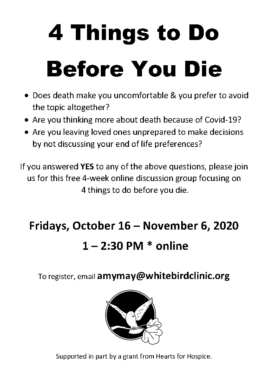White Bird has received a generous grant from Hearts for Hospice to assist uninsured clients with End of Life Counseling services, in addition to supporting community outreach and education, training, and operational expenses for the project. White Bird End of Life Counseling is a compassionate, client-centered service that provides support for psychosocial, emotional, and spiritual issues related to death and dying. Our goal is to help ease people through the process of dying, especially those who could not otherwise receive support or services. When a person is terminally ill and has few resources, they may wait until their health deteriorates to the point of hospitalization before seeking services. This means not getting the necessary care until it’s unavoidable. Once the person is ill enough to visit the emergency department, they may be hospitalized or transferred to a nursing home. Our End of Life Counseling program seeks to serve clients who may otherwise be at risk of these stressful outcomes.
The project is lead by Amy May (MSW, QMHP), a member of the White Bird Counseling Department and the CAHOOTS (Crisis Assistance Helping Out On the Streets) team. She has a personal interest in end of life counseling and providing emotional, mental, and spiritual support for people who traditionally have difficulty accessing counseling services. These difficulties may include behavioral issues, substance use disorder, lack of in-home services due to lack of housing, or difficulty maintaining housing. Her beliefs stem from a concern that the dying process is overlooked in our culture, rather than recognized as something sacred and crucial. End of life counseling seeks to help people accept that process and to become at peace with all the difficulties and unknowns. Traditional hospice services partially fill this role, but do not provide ongoing mental health counseling and may be inaccessible to people who are unhoused.
Counselor Amy May discussed her work as an end of life counselor and death doula at White Bird Clinic with Paul van Waardenburg in the latest Revolution RN podcast https://t.co/T6jom2sb6P
Learn more about the White Bird End of Life Counseling at https://t.co/d21Ro83sAr pic.twitter.com/rhwrKXjqgY
— White Bird Clinic (@WhiteBirdClinic) August 4, 2020
White Bird will provide end of life counseling in clients’ homes and over the phone/video, by addressing the social determinants of health, coordinating care, and providing case management. When a person is terminally ill and has few resources, they may wait until their health deteriorates to the point of hospitalization before seeking services. Eugene and Springfield are served by several hospice programs, but only ours provides ongoing therapy at home. We combine the end of life doula model with mental health counseling, with special emphasis on low income and unhoused community members. Before our program, the area had only two such doulas, neither of whom were counselors. The project will serve a need for people who may be socially isolated, low income, housing insecure, disengaged from the social service system, or face other barriers to accessing hospice services.



